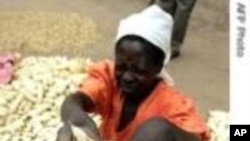The Zimbabwean presidential run-off is scheduled for June 27th, when opposition candidate Morgan Tsvangirai will face President Robert Mugabe. It appears Mr. Mugabe's government is willing to do almost anything to triumph at the polls. Most recently, the government of Zimbabwe ordered non-governmental organizations to suspend operations that include delivery of food and other humanitarian assistance to the country's poorest citizens.
This move, says U.S. State Department Spokesman Sean McCormack, is a "vicious attempt to use food as a political weapon."
"In order to get food aid from the government rationing stations, they [Zimbabweans] have to show their voter registration as well as other identification. And if individuals hand these things over and they are registered to vote for an opposition party, those credentials are kept and held by the government officials, thereby making it impossible for those people to vote in an election. That is cruel in the most sinister kind of way."
The decision to play politics with food is sure to exacerbate the worst food crisis on record in Zimbabwe. Indeed, crops this summer are predicted to feed no more than twenty-eight percent of the population according to an alert issued by the Famine Early Warning Network. U.S. Ambassador to Zimbabwe James McGee said there appeared to be enough food aid stockpiled in Zimbabwe to take care of needs until the election. But Mr. McGee warned of "massive, massive starvation" when supplies run out.
Nevertheless, Ambassador McGee said he believes the presidential run-off should go forward. To put off the vote, he said, would hand the government an undeserved victory. At the same time, he urged the South Africa Development Community and the African Union to rapidly deploy election observers to Zimbabwe to help ensure a fair vote.
The government of Zimbabwe should immediately re-authorize non-governmental organizations to distribute food to those who need it regardless of political affiliation. It is also critical that the government desist from further violence against opposition leaders and supporters as well as ordinary Zimbabweans. The U.S., said State Department spokesman Sean McCormack, is "going to continue to speak out. . .to be a voice and beacon for freedom" in Zimbabwe as that country approaches its presidential runoff election.












